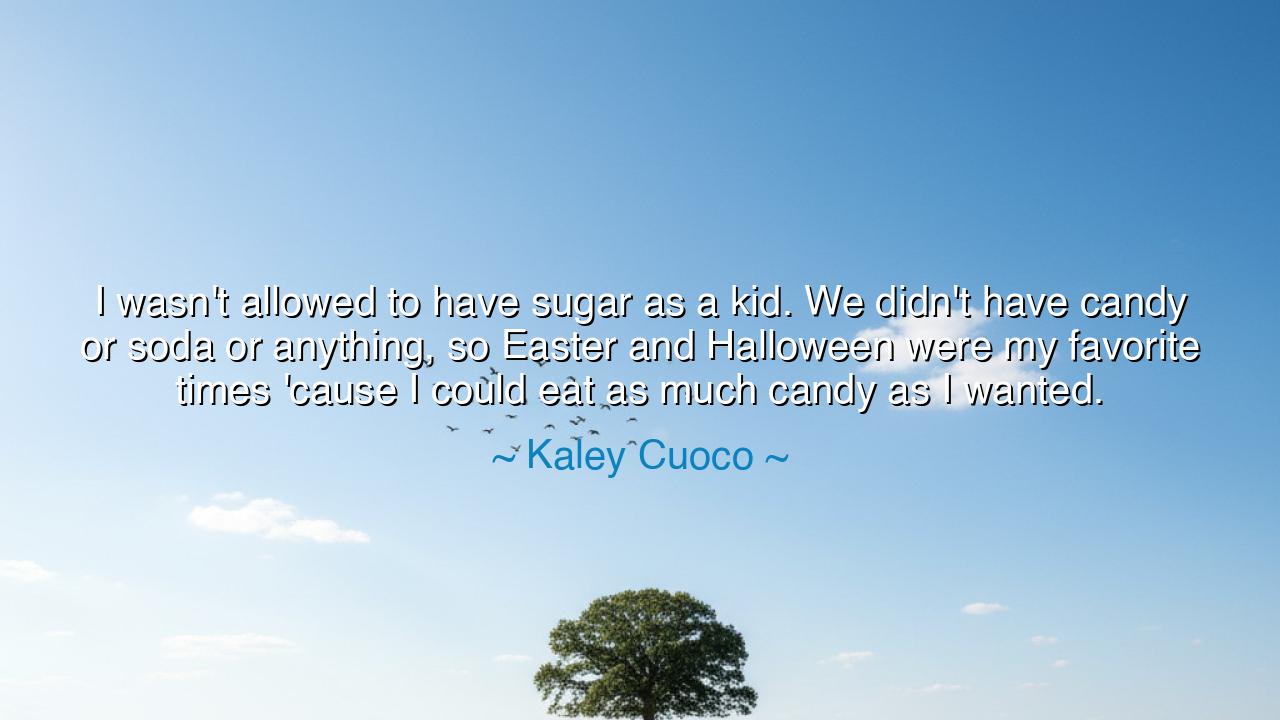
I wasn't allowed to have sugar as a kid. We didn't have candy or
I wasn't allowed to have sugar as a kid. We didn't have candy or soda or anything, so Easter and Halloween were my favorite times 'cause I could eat as much candy as I wanted.






When Kaley Cuoco said, “I wasn't allowed to have sugar as a kid. We didn't have candy or soda or anything, so Easter and Halloween were my favorite times 'cause I could eat as much candy as I wanted,” she spoke not only of childhood memories, but of the deeper rhythm that runs through all human life — the longing for freedom after restraint, the sweetness that follows denial. Beneath her lighthearted reflection lies a timeless truth: that joy shines brightest against the backdrop of limitation. For even the smallest pleasures, when once withheld, become radiant gifts when finally granted.
The origin of this quote comes from Cuoco’s reflections on her upbringing — one shaped by discipline and moderation. In her household, sugar and indulgence were kept at bay, not out of cruelty, but from care and protection. Yet it was precisely this restraint that made the feast of Easter and Halloween so delightful. These were not simply days of candy, but days of release — moments when the gates of discipline opened, and childhood wonder could dance unhindered. Her laughter in recalling those moments carries an ancient wisdom: that the sweetness of life depends upon the contrast between denial and delight, hunger and fulfillment.
In the language of the ancients, this rhythm between restraint and freedom was called temperance. The Greek philosophers taught that happiness is not found in constant indulgence, but in the artful balance of desire — in knowing when to abstain and when to enjoy. Epicurus, often misunderstood as a lover of pleasure, actually warned that pleasure loses its power when it is constant. It is the rare treat, the long-awaited sweetness, that rekindles joy. Kaley Cuoco’s childhood lesson — that the forbidden candy tasted sweeter when finally allowed — mirrors the same eternal teaching: that joy deepens through patience.
History, too, bears witness to this principle. In the Middle Ages, the faithful would endure the fasting of Lent before celebrating the feasts of Easter. For forty days they denied themselves comfort, not as punishment, but as preparation — so that when Easter morning dawned, its celebration of resurrection and renewal would taste all the sweeter. The moment of indulgence carried meaning precisely because it had been preceded by self-restraint. So too, in Cuoco’s story, the child who waited through long months without sugar found in Easter not merely candy, but liberation, the pure joy of savoring what had once been withheld.
And there is another lesson here — one about gratitude. In a world of abundance, where every desire can be instantly fulfilled, the heart grows numb. Pleasure becomes routine, and joy fades into habit. But when life teaches us to wait, to earn, or even to be denied, gratitude blooms. The child who cannot always have candy learns to cherish it when it appears; the adult who has known hardship learns to treasure peace. Thus, restraint is not deprivation, but the soil in which true appreciation grows.
Kaley Cuoco’s recollection, though simple, touches a universal truth: that the heart of celebration lies in contrast. The laughter of children on Easter morning is joyous not merely because of chocolate eggs and bright baskets, but because those gifts symbolize the end of waiting — the return of color after restraint. This pattern is woven into the very fabric of nature: winter gives way to spring, fasting gives way to feast, night yields to dawn. Without the darkness, light cannot be known. Without restraint, delight cannot be felt.
Therefore, the wisdom to carry forward is this: do not despise restraint, for it prepares the soul for joy. Learn to welcome limits, for they give meaning to freedom. Let your life have seasons — moments of discipline that make your moments of celebration shine brighter. As Kaley Cuoco reminds us, even a handful of candy can become a treasure when the heart has learned to wait. And so it is with all of life’s sweetness: it is not the abundance of pleasure that brings happiness, but the ability to taste it with gratitude when it comes.






AAdministratorAdministrator
Welcome, honored guests. Please leave a comment, we will respond soon